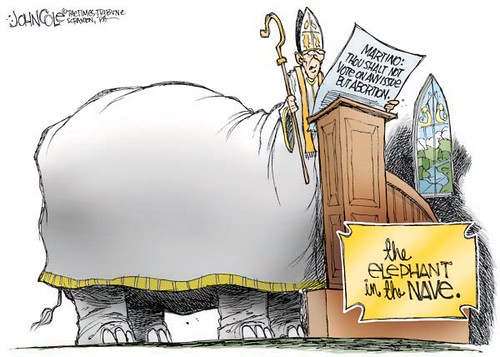
This was published after Bishop Martino of Scranton, PA asked his priests to read his pastoral letter for Respect Life Sunday instead of their Sunday homilys.
Tell me. If this were a leader of another religion, will it be accepted quietly? Will it even have the 'honor' of being printed? How is it that the smallest infringement on other faiths rouses so much debate and recrimination, but this doesn't? Why do people toe the line so carefully when talking about other faiths, but treat the Catholic faith as a free-for-all paint-ball course?
Sometimes, it is just so difficult to turn the other cheek.



2 comments:
Absolutely. There's a book in Central Library: The new anti-Catholicism : the last acceptable prejudice
I guess it'll be an interesting read.
"Blessed are ye when they shall revile you, and persecute you, and speak all that is evil against you, untruly, for my sake: Be glad and rejoice, for your reward is very great in heaven. For so they persecuted the prophets that were before you."
Matthew 5:11
And so they will in the future too.
Interesting. I just might break my miscellaneous book 'fast'. Here's the summary from LINC+:
Anti-Catholicism has a long history in America. And as Philip Jenkins argues in The New Anti-Catholicism, this virulent strain of hatred--once thought dead--is alive and well in our nation, but few people seem to notice, or care.A statement that is seen as racist, misogynistic, anti-Semitic, or homophobic can haunt a speaker for years, writes Jenkins, but it is still possible to make hostile and vituperative public statements about Roman Catholicism without fear of serious repercussions. Jenkins shines a light on anti-Catholic sentiment in American society and illuminates its causes, looking closely at gay and feminist anti-Catholicism, anti-Catholic rhetoric and imagery in the media, and the anti-Catholicism of the academic world. For newspapers and newsmagazines, for television news and in movies, for major book publishers, the Catholic Church has come to provide a grossly stereotyped public villain. Catholic opinions, doctrines, and individual leaders are frequently the butt of harsh satire. Indeed, the notion that the church is a deadly enemy of women--the idea of Catholic misogyny--is commonly accepted in the news media and in popular culture, says Jenkins. And the recent pedophile priest scandal, he shows, has revived many ancient anti-Catholic stereotypes.It was said that with the election of John F. Kennedy, anti-Catholicism in America was dead. This provocative new book corrects that illusion, drawing attention to this important issue.
Post a Comment